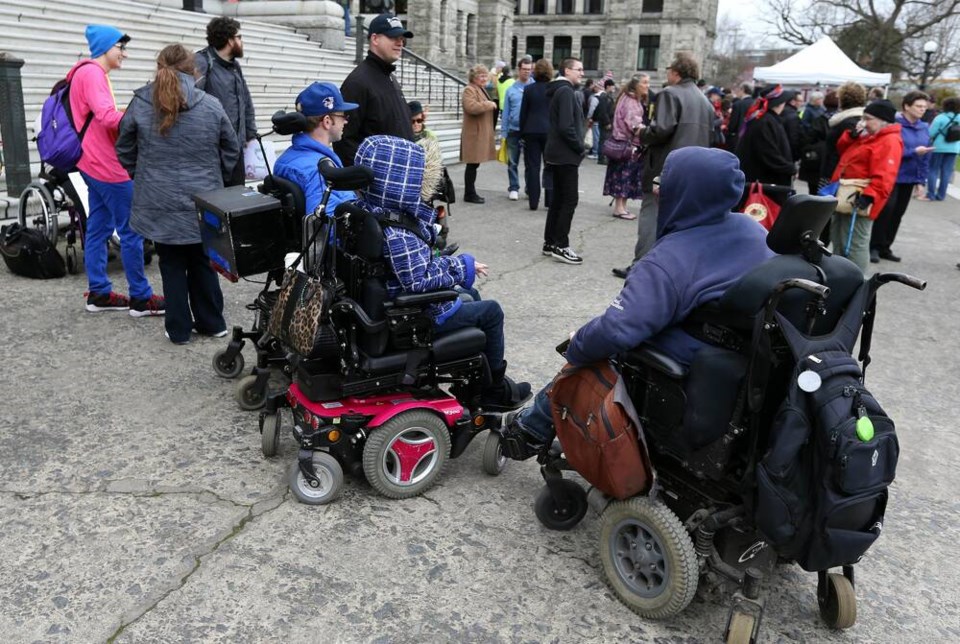A commentary by the editor of B.C. Disability.
With the election approaching, consider how it would sound if one of the major parties attempted to make gains at the polls by proposing a new law, stating the following:
If two people are in a relationship, only one of them can have an income, and they must be the financial caregiver of the other. Dual incomes and mutually beneficial financial relationships aren’t allowed.
Not the most convincing proposal, is it? Might even sound crazy. Well, for Canadians with disabilities, it is disturbingly close to reality.
That is because across the country, provincial policies stop most people from receiving disability or income assistance merely if they have a spouse.
In B.C., all that is required for them to be cut off or ruled ineligible is to have a spouse that makes more than $1,377.56 a month, the standard amount of disability assistance for a person with a disability who is in a two-person family unit.
That’s only $16,530.76 a year, about the equivalent of the province’s $15.20 an hour minimum wage, part-time, and the policy is strikingly similar whichever province you look at: Ontario, Alberta, Manitoba, you name it.
What does this mean?
It means in order to receive much-needed financial assistance, Canadians with disabilities who cannot work or can only work part-time are forced to hide their relationships or not have them in the first place.
It means if they stay in those relationships, they are stripped of their financial independence, expected to be cared for like a child by a spouse who may earn as little as part-time minimum wage.
It means without a source of income, they are pressured to stay in relationships that turn abusive — where else would they go when they have no money?
Some of these toxic dynamics have been captured in B.C., Ontario and New Brunswick, and here are just a few comments from others who have been affected:
“When I got married, I lost all of my disability monies. When my husband became abusive, I could not leave and had no money as he controlled it all.”
“I have been single for 14 years because any man I date more than three times realizes there is no future for us, not if he will have to support me if we ever move in together.”
But for every case mentioned on the TV or in the papers you read, there are thousands more people hurt by policies that make love and marriage equality mere fantasy for disabled Canadians.
Now, one may argue that most spouses share expenses and support each other financially, so each spouse’s income should be considered and looked together as making up one family unit.
Most governments argue this, and the B.C. government used it as the basis of their response to my petition to end the policies that put love and economic survival at odds for disabled British Columbians.
But, setting aside the fact that many people with disabilities have spouses with low incomes themselves, look at the unbalanced standard that gets applied to persons with disabilities.
Two-income families are essential to staying afloat in today’s economy, where cost of living is on the rise.
In 2019, the average household income of B.C. couples was more than $80,000 — many times higher than what someone can make before their spouse is cut from disability assistance, and again far higher than the $22,236.72 disabled couples can collectively make on disability assistance.
Yet provincial governments across Canada do not claw back the earnings of couples without disabilities, no matter how much they make.
So why are persons with disabilities singled out and prevented from having financial independence if they choose to pursue relationships with the people they love? Why are they treated like burdens?
Policies like this force people who are already struggling further to the margins, perpetuating poverty and inequality despite constant lip service to the contrary. Disabled Canadians are treated as dependent children who are to be babysat, not as adults with their own dreams and desires for independence.
To end this systemic discrimination, Canadians with disabilities need to retain their eligibility for financial supports that help them live independently with dignity and contribute more to their communities.
More than 32,500 people have signed BCDisability.com’s petition to end the policies that punish disabled Canadians just for loving, and I hope you will join the movement.
Too many people have suffered for too long, and it is time for change.
- - -
To comment on this article, email a letter to the editor: [email protected]



